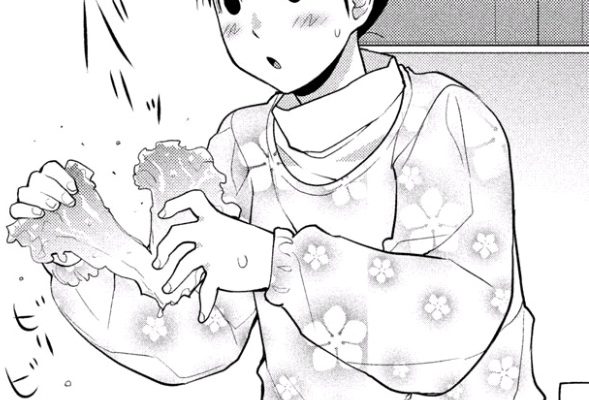
After months of focusing on the same song, the musical possibilities explode.
Summary
Still at their summer training camp (of sorts), the Chorus Appreciation Society decides that they will do four songs for the school culture festival. The only catch is that they’re having trouble narrowing down a final list, even after listening to a wide variety of options.
Ultimately, the group decides that the songs will be chosen by three of the singers plus Hasegawa choose, with Orihara abstaining. To everyone’s surprise, despite his previous objections, Jin actually chooses a song with piano. What’s even more surprising, then, is that Akira doesn’t. While the gentle and harmonious tunes of Akira’s pick resonate with the whole group, Shion is clearly upset and calls Akira a traitor for the second time, despite having forgotten about the first incident.
Songs They Didn’t Choose
Normally, I leave the song list to the end of the review as a bit of extra fun. However, since there’s so many this time and they’re such a central part of this chapter, I thought it best to list them all from the beginning, to split the list up, and to make it the main focus of this review.
Part of the fun is also in looking up what all of these sound like to get a better understanding of why they were or weren’t picked. There’s also the inevitable hurdle of manga being a non-audio media, and I think Kio still hasn’t figured out a way to make the visualization of each song feel different, so it can make the reading experience feel a bit incomplete.
“Daitokai” by Crystal King, aka the Fist of the North Star singers. I actually wish they picked this one!
“Ame” (“Rain”) composed by Tada Takehiko
“Gekkou to Piero” (“Moonlight and Clown”) composed by Shimizu Osamu
“Composition for Men’s Chorus” composed by Mamiya Michio
“Kareki to Taiyou no Uta” (“Song of the Withered Tree and Sun” Ishii Kan
“Kotoba Asobi Uta 2″ (Song Playing with Words 2” and “Kabe Kieta” (“The Wall Disappeared”) composed by Niimi Tokuhide
“Koi no Nai Hi” (“A Day Without Love”), “Itsu kara Ya ni Tatte”, and “Hakobune” (“Ark”), composed by “Kinoshita Makiko”
“Mizu no Inochi” composed by Takata Saburou
Gabriel Foure’s “Requiem Op. 48” (This wasn’t a choice, just a song Orihara wants to listen to on top-of-the-line audio equipment.)
The Four Culture Festival Songs
What I find interesting about these is how the reasons behind each pick clearly reflect the characters themselves.
“March 9” by Remioromen
Shinji purposely picks a song that everyone is familiar with, given that the established goal is to attract new members and become a full-fledged club. It has a soft pop rock feel, and I think it speaks to the fact that Shinji has gotten into singing but is still all about exploring castles. Even though I personally didn’t know this song, it just comes across as the most conventional choice.

“Do You Remember Love?” by Iijima Mari (cv. Lynn Minmei)
Last chapter, I predicted that Hasegawa would go for a Ghibli song, but she hit me with the curviest of curve balls, instead opting for the main theme of the film Macross: Do You Remember Love? Incidentally, it’s the only song besides “Daitokai” that I’ve actually heard before. Hasegawa has already shown her otaku side numerous times, but this really clinches her geek status, especially with her infodump about the historical significance of Macross as the first idol anime and the importance of Iijima Mari. I would love to see this animated, just so I could hear a men’s chorus version of this iconic anime song.
“Etupirka” composed by Hirose Ryouhei
While Jin’s song is not a capella like originally intended, it’s still technically difficult and speaks to his desire to show his mom that she’s wrong about him. Even my amateurish ears can tell this song is tough, given its pace. In addition to how “Etupirka” really seems to carry Jin’s will, one of my favorite moments in this chapter is seeing Shion get serious about figuring out how to play it.

“Kokoro no Tsubasa” (“Wings of the Heart” composed by Kitagawa Noboru
Akira explains that he picked this song because the melody, lyrics, and harmony are all soft and gentle but also supportive. It makes sense, seeing as he also picked “Miagete Goran Yoru no Hoshi o” for the M-Con. It’s certainly a shock that he would not pick a song that includes a piano given how hard he fought for it and his feelings for Shion, but to me, it feels like the song itself was strong enough to him that it actually overrode his prior convictions. There’s a certain strength to Akira, even if it’s not always obvious. Either that, or he did it because he’s still feeling awkward when it comes to Shion.
Fun fact: For this chapter, the team behind Hashikko Ensemble actually got help from the composer Kitagawa Noboru!
Final Thoughts
First, I really want to see this series become an anime now.

Second, check out Shion with the Ogiue hair.








